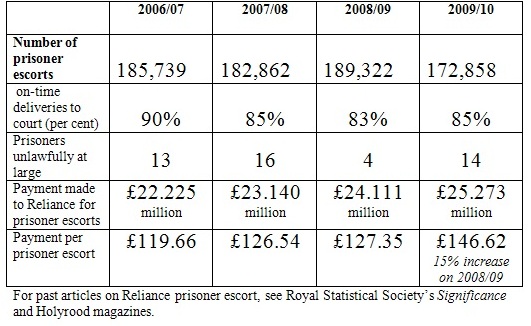Prisoner escorts in Scotland: getting better value
The Scottish Government is currently considering tenders for a seven-year contract to transport prisoners around Scotland.
Tenders were submitted by noon on May 18, for a contract worth around £20 million a year. It is important that the new contract, whoever wins it, does not repeat the mistakes made when the previous one was awarded to Reliance Custodial Services in 2003.
Discovering the details of that contract was not simple. It took two appeals to Scotland’s Information Commissioner to reveal the financial penalties that come into force when the contractor breaches performance thresholds such as on prisoners unlawfully at large, late delivery to court, or incidents of self-harm by prisoners.
Figures that are in the public domain for the past four financial years allow a degree of performance monitoring, as the Table shows. Before Labour left office in Scotland in May 2007, a variation on the Reliance contract was agreed, one effect of which was a marked decrease in the timeliness of deliveries to court – no doubt because financial penalties for poor performance had been relaxed.

Why Reliance’s payments in 2009-10 were 15 per cent more per prisoner-escort than in 2008/09, despite 10 more prisoners unlawfully at large & modest improvement in timeliness is a mystery of privatisation!
The new Scottish contract must not make the mistakes made by its predecessor, such as: the failure to project how the number of prisoner escorts was likely to vary over seven years (a decrease should be anticipated on account of fewer short sentences, fewer courts, and better use of technology by courts); the failure to take inflation into account so that, for example, a planned expenditure of £140 million over 7 years at 2011/12 costs equates to a different total when annual payouts are made at 2012/13 to 2018/19 costs and summed; the failure to report publicly on key performance outcomes other than number of escorts, their cost and timeliness, and numbers of prisoners unlawfully at large; and bypassing independent inspection of prisoner escort until several years into the contract.



